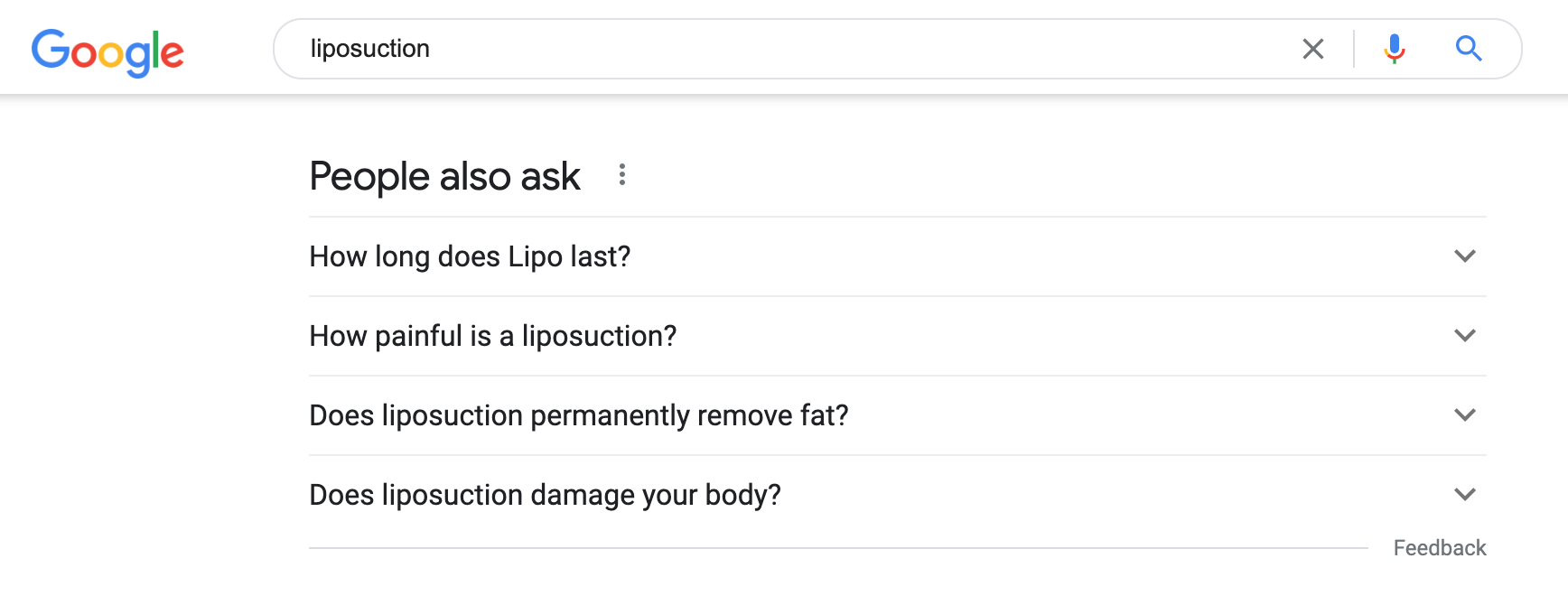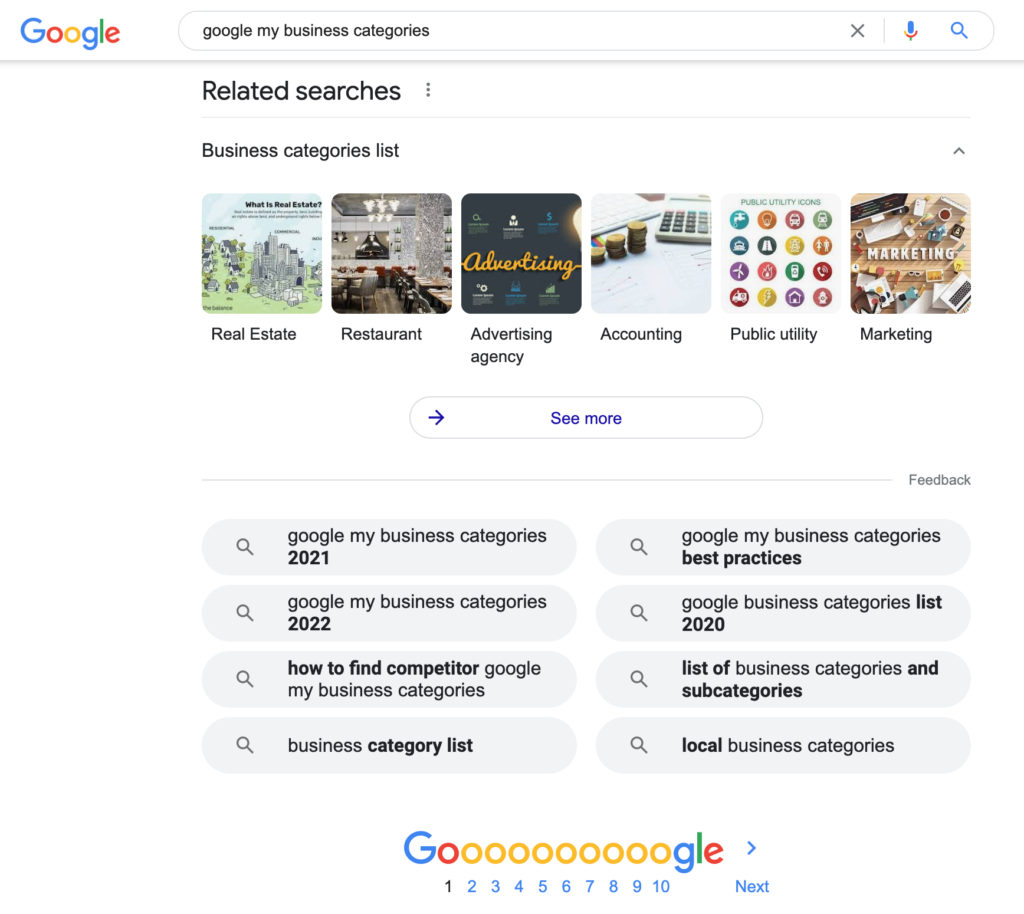Wondering if blogging is a worthwhile marketing strategy for your small business? Creating a quality business blog is far more than frequently writing and publishing posts. Learn about the benefits of blogging, common mistakes, strategies, tips, and examples to give you a head start on creating impactful blog posts for your local business.
Benefits of Small Business Blogs
While blogging every week may seem time-consuming, the effort can be worth it for many small businesses. Here are a few of the most apparent benefits of blogging for small businesses.
Grow Organic Traffic
The primary pages of your website—such as your homepage and product or service pages—are your best opportunity to rank for on-intent search phrases.
Your blog, however, is an opportunity to rank or drive traffic for everything else. The two primary areas a blog can help you with growing traffic are:
- Niche topics about your offering or industry
- Topics higher up the funnel that introduce you to an audience likely to need or be interested in what you offer.
When there’s a strong content strategy in place, it can be common for a website’s blog to be the top organic traffic driver.
Build Topical Authority
Beyond driving organic website traffic for specific topics, an additional SEO benefit of blogging is that you build topical authority. Establish yourself as an authority in your space by providing valuable resources for your audience. This strengthens your site as a whole and can lead to improved traffic to your most important pages.
Share Your Expertise
Whether you’re marketing or not, the best way to earn new local customers is to be the best option in the area. But how can you show someone who hasn’t yet used your service that you are the best option for them? Your blog.
A product or services page can be a great way to quickly explain what your business offers and how it helps the customers, but that’s just the start. If potential customers want to learn more about your product’s manufacturing details, the benefits of one of your services, or how a product can be used, a blog can provide those answers.
For example, a local real estate agent should have a service or “about us” page on their site that explains what someone can expect when they work with the company. Then, they should use a blog to share industry-specific knowledge on the local real estate scene, write compelling content about the good things going on in the community, or provide comprehensive neighborhood guides of the areas they serve.
While you are showing potential clients your expertise in the area, you are also creating localized content that can be valuable for those who aren’t yet moving. But this exposure makes them familiar with your brand and demonstrates your authentic connection to your service area and can eventually attract those people further down the line.
Create Sharable Social Content
Blog content can be impactful off your website as well. Blogs can help you grow your social media presence—in return, social media can help drive traffic to your blog.
Share your compelling blog post links in social media posts, and include an attention-grabbing description to get users to click on your link.
Create Email Marketing Opportunities
Blogs are a great way to provide fresh content to your most loyal customers.
Is your customer base interested in certain topics from your high-quality posts? Put those ideas into an email marketing campaign—but just a sample!
Just like with your social media blog promotion, you don’t want to give away the whole blog in the body of the email. Instead, include a link to your post with an in-depth description of what the blog discusses and how it can benefit your listener.
Build a Resource for Your Customers
Do you have to answer the same questions over and over? Turn your blog into a resource center that answers those commonly-asked questions. This way, customers will be able to find answers to their questions without even having to ask. And not only does this help your clients, but it also saves you time by having a quick place to refer a confused customer.
Small Business Blogging Mistakes
Before diving into strategy, tips, and examples, it’s important to understand the biggest blogging mistakes we commonly see.
Blogging Just Because
If you’re blogging without a strategy and purpose, you might actually do more harm than good. Plus, you’re spending valuable time and resources you could be using somewhere else.
Focusing on How Many Posts You Publish
One of the most common blogging mistakes is that more is better. If your main focus is publishing three times per week and you struggle to come up with strong ideas to support publishing that many blog posts, you’re expending a lot of time and effort that will likely not lead to results.
Creating Thin Content
Often a result of trying to publish too much is publishing thin content. Thin content is not very helpful and can negatively impact your website’s SEO.
Think of it this way—if you’re not publishing something that visitors will genuinely get value from, it’s not worth publishing.
Blogging Strategy for Small Businesses
Identify topics that make sense for your business and drive meaningful results.
Here are two approaches that are both simple and impactful:
- Supplemental content about your product, service, or industry
- Awareness-building content focused on reaching the right audience
Let’s take a deeper look at the different types of business blogs.
Product or Service-Focused Content
For many business types, there’s a lot of research that goes into a customer making a decision. This step in their journey is your business’ opportunity to answer questions that help lead them towards a decision.
Our business, Local Search Fuel, is a great example of service-focused content. Local SEO is pretty complicated, and our audience is researching topics like:
- What is local SEO?
- How to improve Google Business Profile rank
- Digital marketing ideas for small businesses
- How to increase traffic to your website
All of these are services we offer to our clients, so it’s beneficial for our blog to provide resources that help businesses with their local SEO questions.
Awareness-Focused Content
On the other hand, awareness-focused content could be far less related to your business, but just as powerful.
Take a local miniature golf business as an example. You’re not going to make it very far blogging about mini golf. But that doesn’t mean you can’t be strategic and find a way to provide something valuable to your audience that is also beneficial for you.
A business like this could create a blog post about the best things to do with kids in their city. That concept could be expanded into blog posts for the best playgrounds, best splash pads, and more in the area. While this content isn’t about mini golf itself, it is built to reach an audience that is looking for family-friendly activities like mini golf to do.
Small Business Blogging Tips
Let’s take a look at a handful of ways to identify blog opportunities.
Keyword Research
For small businesses, SEO and keyword research tools won’t always make sense. But that’s not the only way to do keyword research. There are several free tools to use, or you can search Google itself to find strong blog topics and optimization opportunities.
Keywordtool.io is a paid keyword research tool with a free version. Though you won’t get to see monthly search volume, you can quickly spot keyword opportunities and trends.
If a Dallas real estate company is writing about the best areas to live in the city, the small business could search “neighborhoods in Dallas” on keywordtool.io to quickly identify promising topic opportunities for their blog.
Answer the Public
One of the best ways to create compelling content is to write about what customers have already shown interest in knowing. Here are a couple of opportunities to find out what your customers want to learn.
Google — People Also Ask
In our example, we’re a cosmetic surgeon offering liposuction. In this industry, doing research and having answers is very important to clients. By simply searching “liposuction” and going down to Google’s “People also ask” section, you can identify questions that will make sense to answer through your blog posts.

Google — Related Searches
Typically, when you Google something, a “related searches” area appears at the bottom of the results page. This is a great way to find ideas for things searchers are most interested in related to your topics.
Using Local Search Fuel as an example, Google Business Profile (also known as Google My Business) is one of the big areas we help small businesses improve online. Several things within Google Business Profile deserve attention and interest searchers, but we’ll focus on categories for this example.
By searching “Google Business Profile categories” and looking at related searches, we instantly can see several potential blog topics. From evaluating competitors to what to do if your category isn’t listed, we can now confidently create blog posts based on what we know our audience wants to read.

Utilize Keywords in Your Blog Posts
In the keyword research section, we focused mostly on using these tools for identifying topics. But it’s also beneficial to use these phrases within the content you’re creating as well.
Let’s use landscape lighting ideas as an example. If you were to create a post about how landscape lighting could upgrade someone’s yard, keyword research will give you valuable terms to mention in your post.
You can quickly identify that your audience will want ideas for the front of the house, driveway, trees, flowerbeds, and more.
Categorize Your Content
Using categories for your blog content is a great way to diversify your blog and help Google crawl your content. Blog categories can help users easily navigate your site and find the posts that interest them.
Properly categorizing your content can have significant SEO benefits. By creating categories, you’re organizing your content in a way that shows Google and other search engines how in-depth you’ve gone into important topics for your business and your audience.
With categories, it is important to be selective and strategic. Having a bunch of categories with a small collection of blog posts isn’t typically very beneficial. Identify topics you’ll cover quite thoroughly as the primary categories.
Avoid Misusing Tags
While effective categories can help your website, tags often get business blogs into trouble. Here are a couple of important things to understand about tags:
- Tags are simply another way to group similar content. An example would be a website that reviews local restaurants. “Restaurant Reviews” might be the category for all of this content, but they’d use tags like “Pizza,” “Chinese,” and “Mexican” to further group similar content together.
- Tags are not a way to optimize content for keywords. What tags do is create a tag page (similar to a category page) that groups content together. Don’t use these like hashtags.
- Every new tag creates a new page on your site. If you randomly add a bunch of tags to every blog post you create, you’ll end up generating lots of thin pages (many will be only one post) that will add a lot of bloat to your site and actually hurt your SEO efforts.
Blogging Ideas for Small Businesses
Looking for some actionable ideas? There’s no shortage of options when it comes to creating blog content including:
- Local events or promotions
- Community outreach efforts
- Home/lifestyle inspiration
- Product guides
- Industry trends
- How-to guides
- Area guides
- Safety guides
- Explanation of your services
- Unconventional uses for your products
Want to implement blogs onto your small business website? Local Search Fuel by Hurrdat offers local business website building and optimization services designed to take your website’s performance to the next level! Get started today!

Grayson McCartney
After playing tennis and majoring in political science at Doane University, Grayson McCartney decided to put his education to use and became a USPTA Elite Tennis Professional in Mckinney, Texas, before changing directions and landing a Content Strategist role at Hurrdat. He has since progressed to his current role of Digital Strategist with a strong passion for tackling niche projects and helping small and local businesses connect with their audiences authentically. In his free time, Grayson enjoys trying and failing to learn the piano, playing golf, participating in weekly softball and volleyball leagues, “nerding out” about 60s & 70s music, and occasionally dusting off the old tennis rackets.
